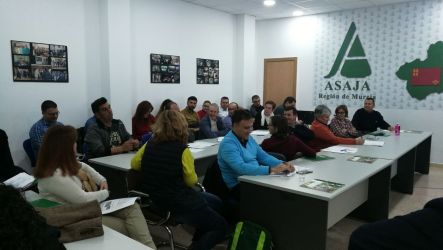Participatory Workshop with end userswas celebrated in the headquarters of ASAJA (AsociaciónAgraria de JóvenesAgricultores), Murcia (Spain). This workshop was organised by the Diverfarming project members involved in the case study 1 (rainfed almond trees) and 2 (irrigated citrus).The main objectives of the workshop were to present to farmers the outcomes of surveys on diversification and management practicesfor both case studies of the Region of Murcia and get feedback from them. In addition, there was a general introduction to the Diverfarming project and a presentation about our long-term case study related to diversification in almond trees by growth of vetch/oat/barley as fodder with reduced tillage (9 years of implementation, NW Murcia).
 The first stage of the Diverfarming project consisted in an innovative participatory process directed to choose the best alternative to diversify current monocultures. The main objectives of this process were to identify the main environmental, agronomic and socioeconomic issues of current almond and citrus orchards under low input management practices, the best low-input management practices to face them and the best complementary species to introduce crop diversification in these agro-ecosystems. The methodology consisted in surveys directed to experts involved in the management of citrus and almond trees orchardsincluding farmers and staff from public administration, NGOs and Academia.
The first stage of the Diverfarming project consisted in an innovative participatory process directed to choose the best alternative to diversify current monocultures. The main objectives of this process were to identify the main environmental, agronomic and socioeconomic issues of current almond and citrus orchards under low input management practices, the best low-input management practices to face them and the best complementary species to introduce crop diversification in these agro-ecosystems. The methodology consisted in surveys directed to experts involved in the management of citrus and almond trees orchardsincluding farmers and staff from public administration, NGOs and Academia.
For the almond trees case study, the outcomes of the surveys presented in the workshop were: minimum tillage, addition of organic residues and integrated control of pests (management), and intercropping diversification with aromatics (thyme) as industrial productand capers or fava bean for food. In the case of the citrus trees case study, the outcomes of the surveys were: organic amendment, integrated control of pests, green manure, cover crops, deficit irrigation (management), and intercropping with aromatics as industrial product, vetch/barley/oat for feed and vegetables.According to these survey outcomes, the experimental design for these case studies has beendefined for a period of three years. Thus, and for the almond case study, minimum tillage will be implemented, with diversification with thyme and caper. For citrus case study, the management practices derived from consultation will be implemented, with intercropping with rotations of multiple cropping of barley/vetch and fava bean (2018), bladder campion, pursiane and cardoon (2019), and cowpea and rocket (2020).
The meeting was very well attended by 10 scientists, 17 farmers and 5 technicians from ASAJA, which engaged in a very interesting and fruitful discussion. The main conclusions of the enriching debate were: 1) The establishment of intercrops against monocrops result in the best option for improving soil quality andfertility while increasing crop production and reducing the use of external inputs; 2) Crops proposed for diversification of almonds trees and citrus are supported by the farmers, having clear benefitsfor soil and environment and from the point of view of the development of new market opportunities; 3) The potential benefits linked to the choice of vegetation cover in rows over geotextile or the use of herbicides are evident. Farmers support the use of selected cover crops to minimise the use of herbicides; 4) The adoption of deficit irrigation practices as proposed in the projectresults of great interest because of the drought issue in the Region of Murcia.
According to the outcomes of this workshop, it is evident that the project has been very well received by farmers. In addition, it provides strong evidences on the convenience of the development of the Diverfarming project and the adoption of the proposed measures.










